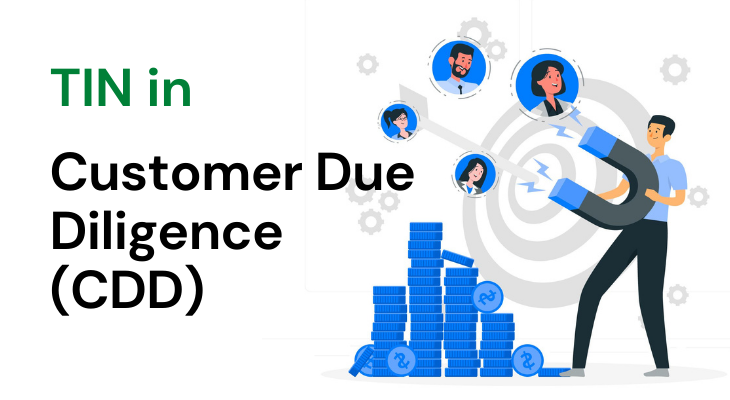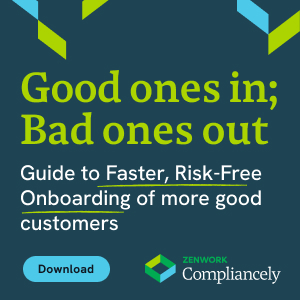The Importance of TIN in Customer Due Diligence (CDD) & How To Verify It?

A simple yet powerful tool that enables you to verify the tax and regulatory compliance status of entities and individuals, TIN matching primarily enables businesses to identify, validate, and verify the real identities of the vendors or profiles.
This makes it one of the most critical elements of information reporting, both from a regulatory and legal perspective.
A TIN acts as an identifier for businesses.
Usually, when the IRS assigns a TIN or an EIN to an entity, the IRS recognizes the entity with this identifier and tracks all business activity and tax reporting through the assigned TIN.
Business vetting or more formally, due diligence, requires the use of identifiers to validate the identity of the claimernt (be it an entity or a person).
Due to the rise in identity theft, businesses are relying on the accuracy that TIN matching brings along with ascertaining checks that follow suit.
Although TIN matching is a static mechanized protocol, its application produces a wave-like dynamism to the KYC process.
But before we get to that, let’s start with the basics.
Defining TIN Match
The taxpayer identification number along with the legal name of the individual or entity is obtained through a Form W-9. This information is searched against the IRS database to find a real-time match in the official records. If the TIN and the legal name combination match the IRS records, it’s a TIN match.
And this TIN match process enables businesses to vet the tax and regulatory compliance status of a self-employed individual or an entity.
Now, why do businesses and enterprise industries alike place such high importance on TIN matching, especially for due diligence? The perspective and importance of TIN matching change as the ecosystem and its business experiences change.
For example, a banking institution will require TIN and legal information for due diligence procedures and verifying the legal standing status of the individual or entity.
For an insurance agency, a TIN and legal name will help identify and validate the credibility of the information.
For a business, a TIN and legal name combination are required for payee TIN reporting. TIN matching and its utility dynamically changes for every use case because TIN match results are indicative of the credibility (or the lack of) of a profile.
Let’s look at TIN matching and its role in customer due diligence.
Customer Due Diligence
Customer due diligence is a process of validating the identities of a profile through a series of authorized checks, such as TIN matching, OFAC watch list, FATCA, and other identity checks. The checks and the data lists against which the identities are validated are authorized by the federal agencies and hence, make these checks valid and feasible.
The due diligence procedure enables a business to conduct a comprehensive profile screening prior to onboarding. For example, a financial institution is authorized to obtain the identity information along with the proof of identity to validate the customer’s profile. The results of these investigations also help the entity assess the risk factor of the customer, allowing the bank to decide if the risk ratio is below or equal to the general approval threshold.
Customer due diligence procedure enables entities to vet a profile’s identities per the official records of the federal agencies, such as the IRS, SSA, Treasury Department, and so on. TIN matching is one of the many crucial steps of investigations incorporated by compliance teams of financial institutions because it allows the institution to gain insights into the legal, tax compliance, regulatory compliance status. Most importantly, it allows the bank to verify the TINs per the official records of the IRS.
But what kind of a role does TIN match play in customer due diligence?
Role Of TIN Match In Due Diligence
TIN Matching is a simple procedure of verifying the incoming profile’s tax details against the authorized data lists. But TIN matching also allows you to check not just the identities of the entity or the individual, but the real-time compliance in a narrow perspective, giving you insights to expand your investigations based on the results.
Verifying TIN For Due Diligence
For example, if your TIN lookup results retrieve “invalid” or “incorrect” results, it means that the individual or entity has provided incorrect or invalid TIN details to you. If the TIN Match search says “invalid” it means that the details do not exist in the IRS database. Incorrect details mean that the TIN assignment/sequence number is correct but one or more characters could be wrong.
If the error was due to a genuine typo or miscommunication from the customer’s end, then sure it is excusable to some extent. If on request, the individual refuses to provide accurate information, they’re indicating their reluctance to reveal the correct information.
Another compliance search in addition to the TIN match can help you further validate your conclusions. Let’s say that you look up the identities of the entity against the SOS Entity Search data list or social security administration (for an individual), and the results you retrieve are similar to TIN Match inquiries, you might be dealing with a potentially high-risk profile.
Enhanced due diligence enables you to expand your investigations as required within reason and feasibility. This means if one of your investigations leads you to a negative result, then you can further validate the details against another authorized database to assess the risk of a profile in accordance with the severity of the risk they possess.
For example, if a profile’s TIN match results are fine but identities are also listed in the Designated Foreign Terrorist Organization’s list or a politically exposed people’s data list, you can conclude that the profile possesses high risk.
Depending on the internal KYC protocols and the regulatory measures specified by the federal government, you can take the appropriate steps.
But here’s something you should know.
While verifying the identities of profiles is quote exhausting and sometimes may seem like a repetitive exercise, it can help you assess the profile’s risk, preventing possible money laundering and terrorism financing.
Fundamentally, the KYC verification procedures are in place to prevent onboarding individuals or entities with a history of engaging with money laundering, terrorism or terror groups, and alike activities. Your KYC checks are powered with a real-time identity check infrastructure, Compliancely.
Right from TIN matching, OFAC watch list, SOS Entity check to FATCA, and tax-exempt check, Compliancely has all the key checks you will need to verify a profile’s identities and assess risk.

